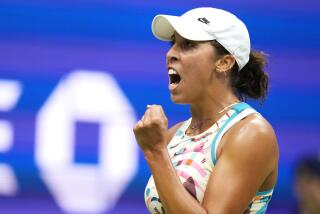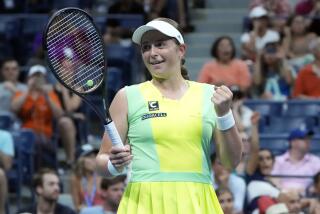U.S. Open Women’s Matches : No. 4 Shriver Ousted in Three Sets by Soviet
- Share via
NEW YORK — These were the days that Pam Shriver had been waiting for, ever since she shot to prominence by reaching the U.S. Open final in 1978.
During most of the last 10 years, Shriver regarded the Chris Evert-Martina Navratilova grip on women’s tennis as a dynasty, of which she could have no part.
But there was hope. When Evert and Navratilova quit hitting their shots past Shriver and everyone else, Shriver thought she could finally move past her perennial spot as, well, Semifinal Shriver.
In ‘78, Shriver reached the final of just her second Grand Slam event. She never repeated that feat, and if her play Thursday was any indication, it doesn’t appear as though she’ll do it soon.
Instead of losing to the new champion, Steffi Graf, or even the aging Evert or Navratilova, Shriver, 26, stumbled against a 20-year-old Soviet player, Leila Meskhi.
Leila Meskhi?
Here, 10 years after she made a name for herself, Shriver helped Meskhi make a name for herself at the National Tennis Center in Flushing Meadow, losing to the 41st-ranked Meskhi in a second-round match, 4-6, 6-1, 6-4.
“In my two matches here, I’ve had some anxiety attacks that I’ve never had before,” said Shriver, who was seeded fourth.
“It was as bad as wondering when I threw the ball up to serve, if it would be where I thought it would be. It’s just the low point of knowing that you’re not doing anything particularly well and there’s not one thing you can fall back on. In my career, most of the time I’ve been able to bank on being able to serve. And at this point, I’m withdrawing from an empty bank account. There’s nothing there.”
Shriver has been faltering lately; she lost to 15-year-old amateur Amy Frazier in the second round of the Virginia Slims of Los Angeles tournament in August.
Her collapse Thursday was the biggest news on the female side as the rest of the top-seeded women advanced. The top-seeded Graf, who is going for the Grand Slam, had no trouble with Manon Bollegraf of the Netherlands. Bollegraf lost in 52 minutes, 6-1, 6-0.
Also advancing in straight sets were No. 2 Navratilova and No. 5 Gabriela Sabatini. No. 10 Claudia Kohde-Kilsch needed three sets to beat Raffaella Reggi, as did No. 11 Zina Garrison against Helen Kelesi. Wild-card entrant Elise Burgin of Baltimore, who was dropped from the U.S. Olympic women’s team in favor of Evert earlier this summer, played her best match in months but still lost to No. 16 Larisa Savchenko of the Soviet Union, 5-7, 7-5, 6-4.
Burgin and Shriver are close friends who grew up playing one another in the Baltimore area. Both were in the same part of the draw, and now they are together again, on the sideline.
“Instead of a Baltimore quarterfinal, it’s going to be a Russian quarterfinal,” Burgin said.
In a role reversal, the top Soviet player, No. 8 Natalia Zvereva, who lost in the first round to a qualifier Tuesday, gets to watch Meskhi, who is considered to be the third-best women’s player in the Soviet Union.
Meskhi is from Tbilisi, Georgia, which is in the Southern part of the Soviet Union, near the Black Sea. According to the national women’s coach, Olga Morozova, Georgia has the best wine in the world, the friendliest people in the country, and now, a female tennis star.
“The first time I saw her, she was dancing unbelievably,” said Morozova, who lost the 1974 Wimbledon final to Evert. “I thought to myself, ‘God, this girl is good. She’s so light on her feet.’ ”
Meskhi, who doesn’t speak much English and used Morozova as an interpreter, said she was playing to win for once, rather than playing not to lose. Morozova said that Meskhi had often showed good form in practice but didn’t always carry it into matches.
Against Shriver, Meskhi rallied from a 2-4 third-set deficit. In fact, Shriver even had a point for a 3-0 lead. It was almost a repeat of the Frazier match, in which Shriver blew a 3-0 third-set lead.
The crucial point of the third set occurred with Shriver serving at 4-3, down 30-40. Meskhi had her thinking cross-court, then ripped a forehand passing shot down the line, forcing Shriver to flub a backhand volley. That pulled Meskhi to 4-4, and she took the lead on her own serve by making a spectacular running forehand cross-court passing shot after being pulled wide. Then Meskhi broke Shriver and won it on her second match point with a forehand return winner at Shriver’s feet.
So, Meskhi moved on to a third-round meeting with Terry Phelps and Shriver closed the book on 1988 Grand Slam tournaments.
“Sometimes you wonder if it’s worth it to go out there,” Shriver said, almost tearfully. “But you know that you’ve got to get to the other side of the cycle. I’m never one to run away from things, but every once in a while you just wish that you could disappear for about six months and then come back out.”
More to Read
Go beyond the scoreboard
Get the latest on L.A.'s teams in the daily Sports Report newsletter.
You may occasionally receive promotional content from the Los Angeles Times.











